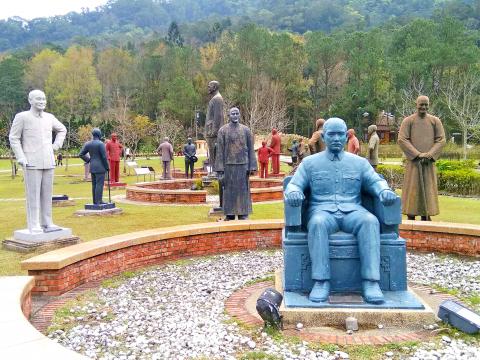The Cihu Memorial Sculpture Park in Taoyuan will not be removing any statues relating to Chiang Kai-shek (蔣中正) and his son, former president Chiang Ching-kuo (蔣經國), as the park is “a commemoration of history, and not any particular person,” the Taoyuan City Government said yesterday.
The question arose following the Ministry of Culture’s announcement on Saturday that it was working on a bill to reinvent the Chiang Kai-shek Memorial Hall, including possibly renaming the Taipei landmark, removing Chiang Kai-shek’s statue from it and stopping sales of souvenir products bearing his likeness.
Taoyuan Department of Public Information Director Xavier Chang (張惇涵) said that Cihu park was set up under then-Taoyuan county commissioner Annette Lu (呂秀蓮) of the Democratic Progressive Party in an effort to end the deification of Chiang Kai-shek and for people to view the statues at the park as historical and cultural artifacts.

Photo: CNA
The focus of the park has ceased to be the two Chiangs, whose statues have simply become part of the park’s sculptures, Chang said.
Taoyuan Mayor Cheng Wen-tsan (鄭文燦) fully agrees that Taiwanese should learn from their past and ensure that all forms of deification ends with the authoritarian regime, Chang said.
As for souvenirs sold at the park’s shop, Chang said they are not limited to images of Chiang Kai-shek, but include other items featuring the nation’s famed tourist spots, historical items relating to the Chinese Civil War and figurines of other historical figures such as Republic of China founder Sun Yat-sen (孫逸仙) and former Chinese leader Mao Zedong (毛澤東).
The city government has no intention of taking the products off the shelves, he said.

The first global hotel Keys Selection by the Michelin Guide includes four hotels in Taiwan, Michelin announced yesterday. All four received the “Michelin One Key,” indicating guests are to experience a “very special stay” at any of the locations as the establishments are “a true gem with personality. Service always goes the extra mile, and the hotel provides much more than others in its price range.” Of the four hotels, three are located in Taipei and one in Taichung. In Taipei, the One Key accolades were awarded to the Capella Taipei, Kimpton Da An Taipei and Mandarin Oriental Taipei. Capella Taipei was described by

EVA Airways today confirmed the death of a flight attendant on Saturday upon their return to Taiwan and said an internal investigation has been launched, as criticism mounted over a social media post accusing the airline of failing to offer sufficient employee protections. According to the post, the flight attendant complained of feeling sick on board a flight, but was unable to take sick leave or access medical care. The crew member allegedly did not receive assistance from the chief purser, who failed to heed their requests for medical attention or call an ambulance once the flight landed, the post said. As sick

The Taichung District Court yesterday confirmed its final ruling that the marriage between teenage heir Lai (賴) and a man surnamed Hsia (夏) was legally invalid, preventing Hsia from inheriting Lai’s NT$500 million (US$16.37 million) estate. The court confirmed that Hsia chose not to appeal the civil judgement after the court handed down its ruling in June, making the decision final. In the June ruling, the court said that Lai, 18, and Hsia, 26, showed “no mutual admiration before the marriage” and that their interactions were “distant and unfamiliar.” The judge concluded that the couple lacked the “true intention of

INDUSTRY: Beijing’s latest export measures go beyond targeting the US and would likely affect any country that uses Chinese rare earths or related tech, an academic said Taiwanese industries could face significant disruption from China’s newly tightened export controls on rare earth elements, as much of Taiwan’s supply indirectly depends on Chinese materials processed in Japan, a local expert said yesterday. Kristy Hsu (徐遵慈), director of the Taiwan ASEAN Studies Center at the Chung-Hua Institution for Economic Research, said that China’s latest export measures go far beyond targeting the US and would likely affect any country that uses Chinese rare earths or related technologies. With Japan and Southeast Asian countries among those expected to be hit, Taiwan could feel the impact through its reliance on Japanese-made semi-finished products and